|
I'm walking my little dogs, after the club announced Tom Boyd's retirement. The autumn air is crisp; there's a blazing sunset but I barely notice it. Running alongside my tangled thoughts, a couple of lines from a Beatles song are, annoyingly, stuck in my head.
I heard the news today, oh boy, About a lucky man who made the grade... The news of Tom's retirement has hit me like a truck. There's a sadness and sense of loss that could be disproportionate about someone I've never even met. It's got almost nothing to do with his on-field contributions or what he could have done for us on the football field. Something much more important is preoccupying me. His retirement crystallises all the things that are the other side of my love affair with footy. Players on pedestals, made to fit our preconceived ideas of their golden lives as they pose at the Portsea Polo. Snide media, hoping, barracking, for failure. Over-the-top adulation of young players, so quickly descending into spite and vitriol. And I'm look backing through the time tunnel, to the end of 2014, when first Tom Boyd's name was linked to ours. Ryan Griffen had defected; days later we were also without a coach. Our club was further away from a premiership than ever before. We were incandescent with rage at Ryan Griffen. We scoffed when he said he had lost the enjoyment of footy. We weren't going to buy that feeble excuse, undoubtedly just code for: 'The Giants have offered me a crap-load of money and I want to play for a club that will soon win a premiership.' We wanted our club to strike back, strike back hard. In our abject state, just hearing that Tom Boyd, who'd been picked as the nation's best young player, was considering our club as a destination, was a fillip. When he actually said he would come - to US, the battling Bulldogs - there was a tinge of hysteria in our joy. Cop that, footy world and naysayers! The footy world mocked the amount we'd paid for a guy who, despite his lofty draft status, was still unproven, calling him the Million Dollar Man, but we were defiant. We'd dreamt big, for once. Was that really so wrong? About Tom Boyd, the 19-year-old person, we knew little. He was a pawn, successfully used to checkmate the mess in which our club was floundering. If we worried about the impact of the fevered media attention on a teenager, our fears were quickly allayed, or rather we wanted them to be. Tom Boyd was well-spoken, thoughtful, mature, intelligent. Maybe if he'd been one of those spindly, frail-looking 19-year-olds, we'd have been more worried, but he looked so solid, so robust; we brushed the concerns aside. Maybe, just maybe, we were too desperate for that flag to think about it too deeply. And, after all, the gamble worked, didn't it?. A whole chain of events flowed from the Tom Boyd trade. A new coach, a reset of that dream which was closer than we knew, and the man himself turning on a breathtakingly wonderful Grand Final performance. He was the Norm Smith medallist in most of our minds. His was the goal that brought on the famous description: 'the stadium holds its breath.' As it went through, Tom reached skywards in triumph. Triumph, and maybe release from the weight of the terrible expectations placed on his shoulders; he said afterwards that he wasn't even aware of Toby McLean jumping on his back. The dramatic, famous last chord from 'A day in the life' could have rung out right then, reverberating around the stadium. Our sorry history overturned, the wicked spell cast on our club broken at last. Vindication for the Tom Boyd story! Things are never as they appear though, are they? In the months and years after 2014, I'd already begun reflecting differently on Ryan Griffen, who said he'd lost the love of the game. Now, I began to remember him looking stooped and burdened by the captaincy, no longer bouncing the ball and running down the wing, struggling with form, a heaviness in his demeanour. He didn't get that premiership with the Giants; Tom Boyd, to all intents and purposes, was the 'winner' of that controversial and fateful player exchange. There were so many meanings that could be constructed around the ways their careers intersected, including the fact that it was the Dogs, not the Giants, who got to the grand final first. There's an irony in the fact, though, that Tom Boyd, who did achieve the ultimate reward, has reached a similar turning point to Ryan Griffen and lost the joy of the game. In 2017 we were initially bewildered, a little puzzled, then fiercely protective, when Tom announced he would stand aside from footy due to mental health concerns. When he was further down the path of recovery, he spoke, in a podcast with Bob Murphy, about how easily everything had come to him earlier in life, leaving him ill-equipped to deal with times of adversity. Tom became an ambassador for the mental health organisation for young people, Headspace; he spoke with beautiful eloquence of times that were dark, said that the apparent fairytale premiership performance had only papered over the cracks in his well-being. He talked of not sleeping for weeks, panic attacks, an inability to concentrate. I felt proud, as a mother of sons myself, that this sensitive, sincere young man was so open; hopeful that he would help others realise that they were not alone in their struggles, that fortune and talent and a so-called perfect life from the outside doesn't immunise you from depression, maybe makes the battle even harder because it is so at odds with what's within. But over the next few weeks, when I saw trams and buses trundle through the city, with Tom's face emblazoned on the side in his ambassador role, I felt uneasy. It was somehow disconcerting. Did Tom have to be perfect, upfront and visible, in this role too? Now at 23, and having played just 61 games, Tom has walked away from a substantial amount of money, and a game with which he was disenchanted. He did not attend a press conference, explaining his decision to us, the fans, or the media that have focused on him with a mean-spirited relentless. Nor should he have to. But the debate about his retirement soon encapsulated everything that is at the heart of Tom Boyd's story. Sympathy and compassion are mixed with confusion; he is labelled (this riled me) an 'unfulfilled talent', and with indecent haste, discussion moves onto how this will free up the Bulldogs' salary cap. And, again and again, the question of the value of the 2014 trade gets picked over. Even the well-meaning view expressed by many Bulldogs' fans, that Tom Boyd 'was worth every cent', made me wince; it seemed an answer to the wrong question. He was again, being measured as a commodity, an investment, a stock that had paid dividends. Because it is actually Tom that has paid the price, for us. There will be no motorcade to farewell Tom Boyd. We won't be able to clap him, as he's hefted on his team-mates shoulders, carried from the ground; there will be no space for a farewell. Meanwhile, there's a game to be played tomorrow. We will lose, or we will win, but for the moment, there's just apathy in my mind about the result. Instead, I prefer to think that, down the road from the Geelong stadium, Tom Boyd who loves to surf, will be chasing waves at Bells Beach, at peace, because in the saddest part of a sad day, his mood after retiring was said to be 'relief.' Many of Tom's team-mates, who'd played alongside him, sat in boring strategy meetings, sweated through arduous pre-seasons, seen a different Tom Boyd than the one we will never know, posted on social media. It was restrained, but heartfelt. Just photos of him, few words, and the symbol of a heart. It felt like they were building a circle of kindness around him. And kindness was one of the things rarely extended to Tom Boyd. Whenever I see a new player with the X factor emerge - Bont, and recently Aaron Naughton - beneath my delight, and the selfish hope that they will bring my club success -I find myself uttering a silent prayer. Please remember what it feels like right now, the pure pleasure of flying for a mark, the fun when you sing the song in the rooms. Please let the game not be too hard on you. Please never leave our club. Please make us proud. Now there is something else I'll be muttering like a chant under my breath, to all of our players... including Tom Boyd, player of 61 games, number one draft pick, son, brother, mental health ambassador, surfer, photographer, and the bringer of so much joy to thousands of Bulldogs fans on that one unforgettable day. Please just stay well.
1 Comment
At the end of 2018, the Libba Sisters, in need of recuperation from the trials and tribulations of the season, headed off for a holiday in Bali. As we took our seats in the plane (after the obligatory four-hour Jetstar delay) a tall and athletic figure appeared and strapped himself in, right next to us in the three-seat-aisle.
The Libba Sisters exchanged a significant glance. Because this was no garden-variety tall and athletic figure, but one of our 2016 premiership heroes, Fletcher Roberts. But we played it cool. We figured that Fletch most likely didn’t want to spend six hours trapped alongside two gushing fans acting like excited teenagers, droning on about their thoughts and emotions about the premiership experience. At some point of the long plane trip, though, small talk was exchanged. Fletch, endearingly, said he ‘had a week or two off work, and so was catching up with some mates.’ The Libbas nodded, poker-faced. We didn't let on that we knew Fletch wasn't your average person having a break from his boring job in a payroll office somewhere. We all disembarked; our little brush with fame was at an end. On social media, though, we soon saw the three *ahem* workmates with whom Fletch was holidaying. His fellow premiership team-mate, Lachie Hunter, and two men who came heartbreakingly close to being premiership team-mates: Mitch Wallis, who played all 17 games of the 2016 season until he broke his leg, and Lin Jong, also a regular in that fateful year, who broke his collarbone in the first final in Perth. Neither Lin or Mitch has had a chance to play in a final again. Since 2016 the careers of those four men have meandered in different ways. Lachie has barely missed a match, and is our reigning Charles Sutton medallist. Mitch, after making a comeback from his dreadful injury, last year found himself on the outer. A lack of 'qualitative sheen' was identified as a shortcoming. There was talk of him leaving – maybe even joining – (deep breaths) – the Bombres, before he decided to remain with us. He's been a solid contributor in 2019. Lin Jong has had a horror run with injury and struggled to regain form and consistency on the rare occasions that he has been able to get on the park. But the career trajectory of Fletcher Roberts since the flag has been the most baffling of all. Stranded in the Footscray team last year even when we were decimated by injury, Fletch has been the forgotten man of the 2016 heroes. I wondered, as the four blokes lazed around the pool (possibly trying to work out how to escape any chance encounters with the Libba Sisters), if the talk ever turned to the ‘what ifs’ that had seen two of them reach such heights, while the other two looked on. I thought I knew a lot about the randomness of footy while we waited for that flag to come – the fine line between success and failure, the sliding door moments, the depressing truth that immense talent is no guarantee, in a team game like ours, of premiership success. I just never appreciated that unpredictability and randomness would not vanish once we achieved the ultimate goal. Fletcher Roberts, a 23-year-old playing in a premiership in game number 37, seemed to have the world at his feet. Yet, called upon to play Brisbane this weekend, he is playing just game 50. The call-up indeed came only after our promising ruckman Tim English was a last minute withdrawal. No banner is prepared in honour of the milestone. What were Fletch’s thoughts when, after such a long time in the wilderness, he ran down the race again with so many fresh-faced new team-mates as well as some - but not all - of those who'd played alongside him in the flag? Had he quietly kept his faith that this day would come again? Maybe it would be a turning point, the catalyst for an unexpected renewal of his career. (I began imagining an article, celebrating Fletch’s 200-game milestone, where he reminisced, with a chuckle, about a lean period when he thought he was done and dusted. 'There was a match in Ballarat; from that point, everything turned around for me. I knew it would all be ok if I just persevered.'). Then again maybe his appearance against Brisbane would be a cameo, before he returned to tiny crowds and the smaller stage of the VFL. (I began imagining an article, where in the usual prosaic style, the club thanked him for his service, and a disappointed but philosophical Fletch said that it had been an honour to play for the club. 'I knew my cards were marked when I got dropped after that game in Ballarat. Bevo told me then that I lacked qualitative sheen. Still, I'm looking forward to my new career with the Gold Coast Suns.') Fletch, so familiar in his number 18 guernsey, took up his accustomed position deep on the full-back line. (He has never kicked a goal in his AFL career – even Dale Morris somehow has managed three). At the opposite end of the ground a teenage superstar-in-the-making – one of the boys who was preferred in defence to Fletch in 2018 – also prepared for the game to begin. Excitement has built about his future, this rare blue-chip talent, dubbed already: 'The Astro-Naught.'. Kids will want his number 33 jumper. Excitable fans, even those of a certain age, will most likely be unable to refrain from pestering him, maybe even requesting an embarrassing selfie, should they be seated next to him on a Jetstar flight to Bali. Aaron Naughton starts slowly, as you might expect from a still raw 19-year-old. The Brisbane team were handling the wet conditions better than us, outplaying us in many areas. In 2018 we would have most likely folded under their pressure; even a few weeks ago, our earnest efforts to wrestle back the ascendancy would have collapsed under a barrage of missed shots at goal and aimless entries into the forward line. But in a sign of new maturity, Our Boys persist, working and working even when things aren't going right, and then beginning to take control of the game. Aaron Naughton is a key factor in that turnaround. After his quiet start, Aaron marks on the boundary line. The fact that he’d marked it, that he’d kept leading and presenting despite early signs that this may not be ‘his day’, was further evidence of his talent. The half-time siren sounds; he's now dealing with a difficult and tricky shot with the flukey wind. He slots it home with a superb kick, and the Dogs go into the half-time break, brimming with confidence, riding momentum. In the last quarter the Lions press, again. They are four goals down, but still look dangerous. It's time for blue-collar footy, for making the right decisions with the wet and slippery ball, for weathering clash after clash on the heavy ground. A goal, against the run of play, would be handy too in killing off the Lions’ ambitions. The ‘Astro-Naught’ flies across the face of goal, bringing down what we’re already recognizing as his trademark – well, trademark mark, I guess. The pressure of being 'The Man' doesn't seem to weigh heavily on his 19-year-old shoulders. Fletcher Roberts had nine disposals, though disposal numbers have never been what his performances are about. He was unobtrusive, which is not the same as ineffective. He did not attempt to resurrect his career and demonstrate qualitative sheen with some Naughton-style high marking. He did not make an unexpectedly daring dash to the forward line and wow the crowd with his first ever goal, an Ed Richards-style banana from the boundary. He was dependable, playing well within what you imagine he knows, as much as anyone, are his limits.There was no real clue as to which of my imagined scenarios will play out for Fletch – a rejuvenated career, or a return to journey-man status. Somehow I can't escape the melancholy thought that his name will be the first to be tossed around as an 'out' when we play the Cats. It makes me much sadder than I could have imagined. I find myself thinking about his finals performances in 2016, searching for memories. I had forgotten he only played in two of the four finals. Though he'd played most games, he was not selected for the matches against West Coast and Hawthorn; he only came into the preliminary final team after injury to Matt Suckling. I remember, vaguely, reading that, even then, he spent grand final week unsure whether he would be retained in the team. I can't really remember much of his performances, except that they were solid. Nobody got off the chain against him, he made no glaring mistakes, he played his role. He also served. I search for something a bit more galvanising. When a sharper Fletcher Roberts memory finally emerges, it's vivid, those feverish minutes of the preliminary final against The Acronyms. Jackson Macrae had goaled; we were ahead, but there were agonising moments to endure, Another devastating loss was still a real possibility when, with less than two minutes to go, the ball was pumped forward into The Acronyms' forward line. A forward line packed with glittering talent courtesy of the AFL: supercilious Jeremy Cameron, smarmy Toby Green, haughty Jon Patten, and others for whom I've run out of nasty adjectives. Ours was filled with rejects and rookies. Blue collar, not blue chip. Big-hearted, not big-headed. As the kick spiralled into their star-studded forward line the hopes and dreams of thousands rested with those unheralded defenders all making the right decision, ensuring the wall would withstand the surge. Unobtrusive Fletcher Roberts was one of that wall. Easton Wood made a massive leap, crashing the contest. Danger still awaited; the ball hit the deck. Fletcher Roberts scooped up the ball. In that nightmare parallel universe into which Bulldogs' teams have so often tumbled, he would have fumbled it. But he handled it as cleanly as The Bont. Fletch launched a long bomb out of defence. It would have, in that parallel universe, skewed off his boot, gone out on the full, landed straight in the arms of someone wearing orange. But his kick landed in a pack inside the boundary line. And the ravenous Bulldogs were not going to let that ball back into the Giants' forward line again. We remember JJ's dash, and Macrae's goal, and Clay Smith's ferocity, but Fletcher Roberts played his part in that night's story too. What a strange thing it is, sitting at close quarters for six hours next to someone whose decisions and actions back in 2016 made such an immense difference to my happiness, and yet never exchanging a word to try and tell them so. I wish now, that I'd found a way - unobtrusive, of course - to let Fletcher Roberts know that I appreciate and cherish those moments, and hope there will be more. Maybe I could have just slipped a little note onto his tray-table when he was distracted by the safety demonstration. Just two words would do it. 'Thanks Fletch.' While Our Boys took on Freo many kilometres away, exasperated text messages flew thick and fast between Tragician family members, all stranded helplessly on our respective couches at home. Our blokes were trying so hard, battling away in hostile territory, for so little reward. As the missed opportunities piled up, so too did the level of angst, sprinkled with black humour, at the predictability of the wayward kicking for goal. By the last quarter, we cringed rather than celebrated whenever we got inside 50 metres. The poo emoji soon became an effective shortcut to convey our emotions. (It certainly would have been handy for most of the Tragician’s barracking career). Yet as the final siren sounded, I made one of my bolder, indeed outlandish statements, confidently tipping a win against the Tigers. Considering we’d just registered our fourth painful loss in a row I’m still not sure where this conviction came from. In the wake of the loss the gloom and doom around our club had reached epidemic and slightly hysterical proportions. Among the Bulldog faithful, the mood was agitated. Skill development had gone backwards, fans lamented; premiership stars’ form had stagnated. The kids weren’t coming along as we’d hoped! Selections were baffling. That’s been so ever since Bevo Our Saviour arrived, of course, but now there was open discussion on a previously unthinkable topic: ‘Was Bevo’s time up?’ (Nobody, I regret to report, was calling him Our Saviour either). In support of this hideous question, a narrative, beloved of the outside world but previously angrily resisted by our own fans, took hold: The achievement of the premiership had been some kind of fluke, where an ordinary bunch of players and coaching staff got lucky, combining to pull off a daring heist on the competition, before slinking back into our usual well-deserved mediocrity. I was astonished, not so much by the negativity, but by how familiar the tone of the commentary was. The Bontempelli ‘why not us?’ question had in the blink of an eye reverted to ‘why us?’ That undercurrent of thinking – that there’s something quintessentially wrong with our club – had somehow, like a plague of cockroaches, withstood the premiership win; mysteriously, it had re-emerged, reinforced, indeed confirmed, by the speed with which the Battling Bulldogs had reverted to type. How come only our club could go spectacularly backwards, after a flag won by one of the youngest groups ever? Why hadn’t that day in 2016 liberated us, forever, from our dismal past, as it had with the Geelong and Richmond clubs, who once they got the sniff of success, chased it even more hungrily? It wasn’t just that the questions were posed that startled me. It was that the same old bitterness, honed through decades of failure, still existed underneath them. I detected panic that our golden memory of 2016 was becoming another cruel joke at our expense, a bit like a child being informed that Santa wasn’t real. Against this backdrop, my announcement that the Bulldogs would triumph was more than a little eccentric, especially coming from one who was just as strongly convinced (with good reason as it sadly turned out) that we’d lose to Carlton. Yet apart from that abomination, which fortunately I’d avoided, I didn’t feel our team was actually playing badly. (A bit like Greg Chappell when he defended those seven ducks in a row by saying he wasn’t in the crease long enough to actually be playing poorly). I still saw spirit and heart and self-belief. We just weren’t ... kicking goals, which is kind of an essential part of the game, I’ll admit. The first quarter of the clash against Richmond contained moments that initially boded well for my reckless prediction. We won the ball, time and again. The Bont started in majestic form, as he wrested the ball from packs and then loped in his characteristic way into our forward line, calmly slotting a difficult goal. Whatever today’s outcome, I decided, I could sit back and revel in a peerless display from our Artist-in-residence. But his team-mates were not able to emulate his effort. Again, the missed shots accumulated. You could see the mental struggle in which our players were stuck, like quicksand, dreading to be the one who would be next to create that moaning sigh of disappointment from our crowd (not to mention a barrage of poo emojis on social media). My pre-game confidence wavered. Perhaps it was inevitable, the way the match would play out. The gallant Dogs would keep working tirelessly, fruitlessly; the ruthless, efficient Tigers would punish our turnovers, conjuring goals so much less painfully than us. The Tigers song would reverberate around the stadium, while I hastily deleted my ludicrous text message. Bevo would walk down from the coaching box, to sullen mutters among the restless crowd, wearing the blank expression of the coach under siege. We would head home, resigned, angry, baffled and heartsore. I would wonder if those troubling questions about our club had the tiniest kernel of truth. We needed something, somebody to change that story. We were waiting. We just didn’t know what for. Aaron Naughton entered the stage. Suddenly every time he went near the ball, we hoped, and then came to expect, he would mark it. And..he'd then kick a goal! In an amazing blitz, he was electrifying, exhilarating, spectacular. The degree of difficulty only spurred him on. ‘A crowded pack of players? I guess I’ll just have to jump over the top of you all.’ We once saw another teenager inspire us with his gift for marking, but Chris Grant, memorably described by Martin Flanagan as ‘the boy with the solemn hands’ marked in a different way. Smoothly, elegantly, the ball glided into his mitts. I can't find the words for what Aaron Naughton is doing out there. Players ‘drag down’ a mark’, or ‘grab’ the ball, or 'clunk' it or 'catch' it; but they are phrases too humdrum to describe what we were watching, with increasing awe. I find myself reaching for another sport for an analogy, for with his exquisite timing and feel for the ball, he resembled a surfer, catching the surge of the perfect wave. Maybe it was even simpler: he was just playing park footy, a kid revelling in taking speckies over his mates. The crowd mood shifted. Buoyant, excited, appreciative, spellbound. We wanted more. Aaron Naughton (and the Herald Sun hit perfect pitch when they dubbed him the Astro-Naught) was only too happy to deliver. He was even having such a good time, that he gave a little wink after another brilliant mark. It could have been lair-like, but I don’t think (unlike ‘Somebody Else of a Lairy Disposition’ we could mention), it was about himself. It wasn’t cocky, or arrogant. It was more like what I've dubbed 'the Bontempelli smirk'. ‘How good, and simple, and fun is footy. By the time we woke from the spell that he’d cast, we were six, seven goals up from the Tiges. The Tragician was looking smug and searching for a screenshot of that text message to show all and sundry she was a sage, an oracle, a soothsayer. In between my attempts to somehow claim credit for the win, I thought about Luke Beveridge. Saturday night was his 100th game; Bob wrote a tribute trying to capture his enigmatic coach. He said that when he arrived at our despondent club in 2014, its players riven with doubt and haunted by failure, Bevo (who will forever be Our Saviour) began asking them: ‘How good could you be?’ I think of Aaron Naughton, who didn't manage even one contested mark against Freo, throwing himself carelessly, joyfully, towards the ball, and wonder if his coach’s words ring in his ear. So much of my thinking, and I'm not alone, since 2016 has been about the premiership group. Would THEY re-discover the hunger? How had THEY coped with climbing the summit? When would THEY do it for us, again? Yet just as the fearless boys of 2016 didn’t care a jot about what had gone before, that flag is ancient history for the newbies whose hunger is raw. Tim English, Bailey Smith, Ed Richards - you can feel sure they're going to create their own story. I guess I'll need to strap myself in for another rollercoaster ride. When Our Boys sang the song, Aaron Naughton, who won’t turn 20 until the end of the 2019 season, was the most exuberant of the exuberant. I couldn’t help but laugh; it was like his singing, and accompanying half-jig, echoed the carefree way he'd approached the ball. I heard a journalist on the radio the next day, talking about an interview with "The Astro-Naught" at the start of the season. ‘Nothing fazes him,’ he said. ‘He's an uncomplicated guy. He just loves footy. 'But he did say one thing,' the journalist, too, began to laugh, remembering our number 33's amazing deeds: 'I like to launch.’ Watch Aaron Naughton sing the song: https://www.westernbulldogs.com.au/video/2019-05-04/team-song-western-bulldogs |
About the Bulldog TragicianThe Tragician blog began in 2013 as a way of recording what it is like to barrack for a perennially unsuccessful team - the AFL team, the Western Bulldogs. Categories
All
Archives
August 2023
|
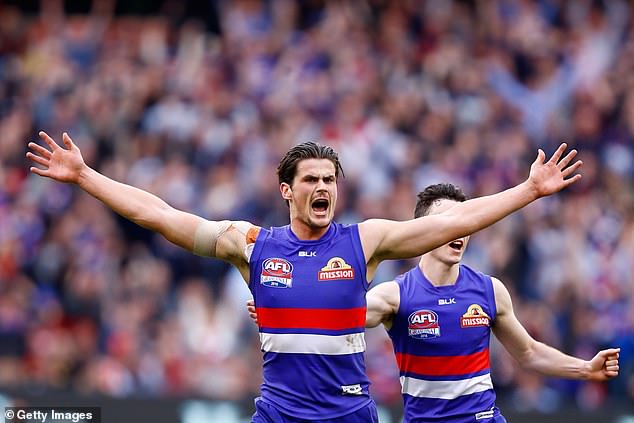
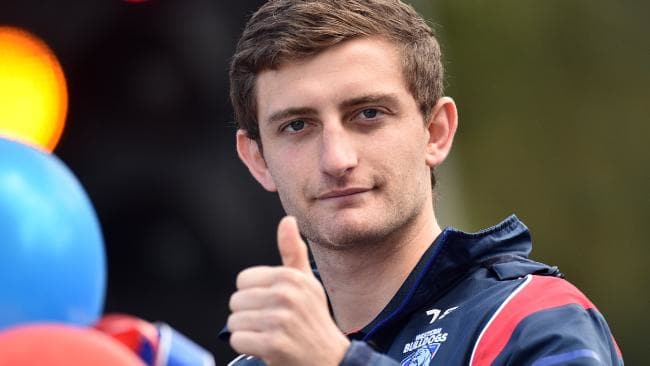
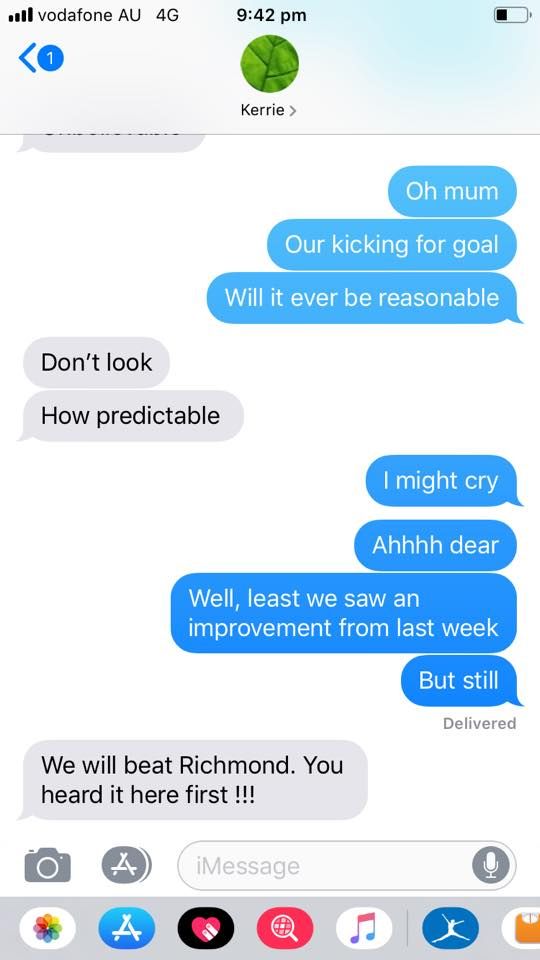
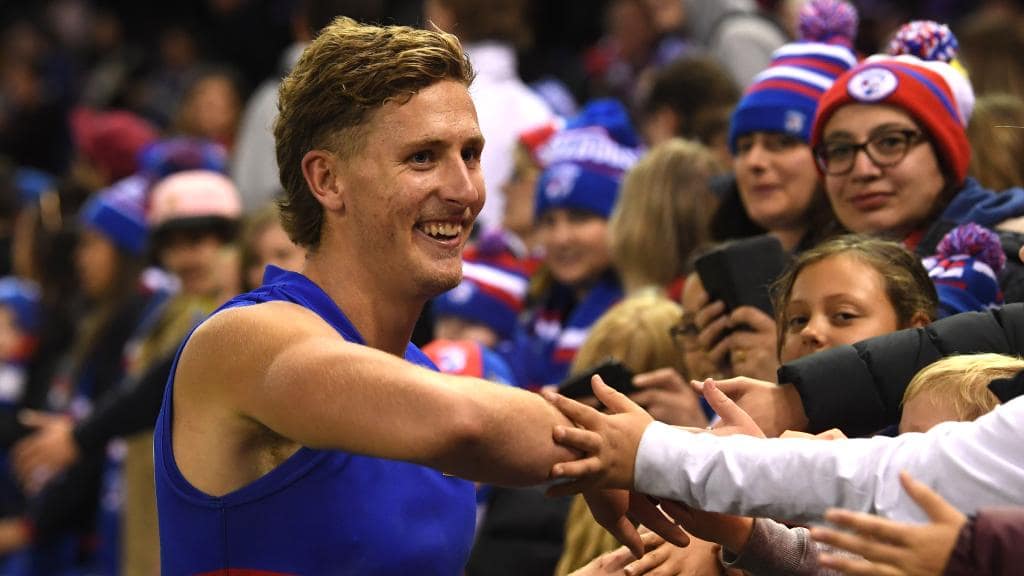
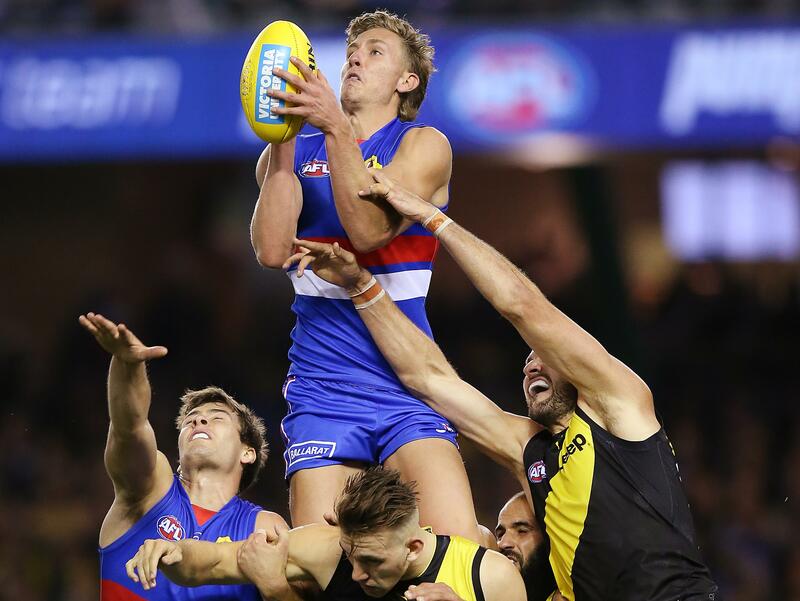
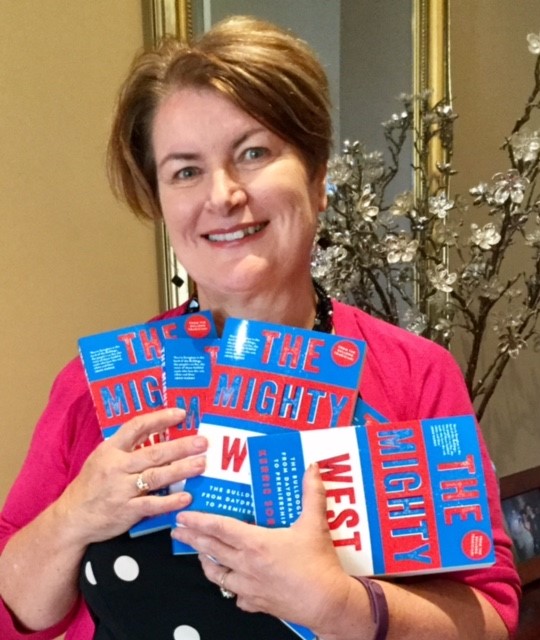
 RSS Feed
RSS Feed